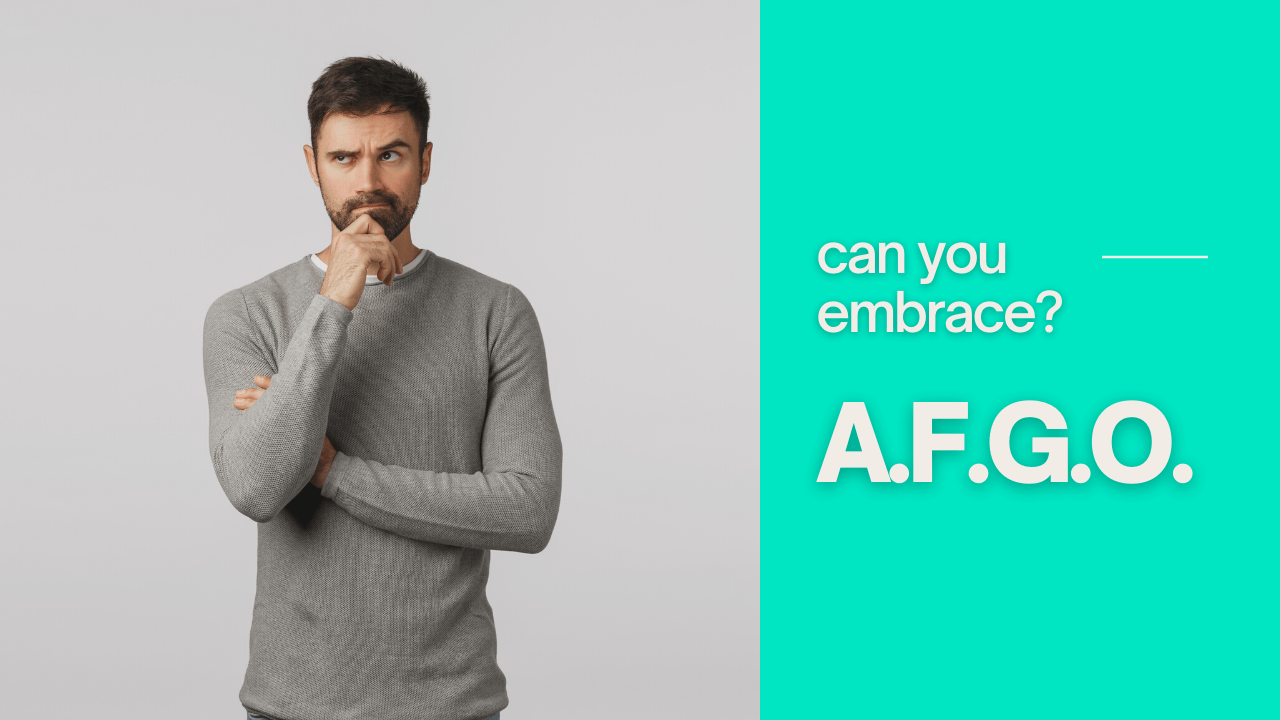Positive stressors, negative stressors, and how to respond to them in an empowering way.
Eustress, pronounced "you-stress" is stress that's good for you. More precisely, it's a stressor (outside stimulus) that's
interpreted as beneficial by the experiencer.
In this post you'll learn about eustress, positive and negative stressors, and how to see opportunities in adversity. You'll also learn a fun acronym called AFGO.
Stress or Stressor?
The word "stress" is thrown around without being clearly defined. People say, "I'm so stressed out" or "work is so stressful."
But stress is a feeling, a
subjective experience. One person might feel anxious about their job, while their coworker might feel excited and motivated. Same job, different feelings. So it's not that the job is stressful, it's how one interprets the stimuli received from the job.
"Stress" then, I propose, is a term of disempowerment. It assigns the blame (and the hence the power) to the outside event.
The word "stressor" is the better term. It's the
outside stimulus. The word stressor separates the event from the experiencer. It empowers the experiencer with
the choice of how to respond to the event.
Positive vs. Negative Stressors
Positive stressors are events that typically produce intense emotions and a positive benefit for the experiencer.
Things like weddings, graduations, and acceptance speeches are examples of positive stressors. They activate the same anxiety circuits as negative events, but with a bit of a twist. The experiencer knows there's a reward on the other side of the anxiety. He may feel giddy or have butterflies.
Negative stressors are what you might imagine: events like a death in the family, a divorce, a tax audit, or losing your job.
It's important to highlight that both negative and positive stressors are
typical, meaning most people agree on what's positive and negative. However, some people might experience a negative stressor as positive.
In this short video
Simon Sinek has a great story about how Olympic athletes interpret stressors versus how the journalists who interview them interpret stressors. This is where eustress comes in...
Eustress
Webster's defines
eustress as, "a positive form of stress having a beneficial effect on health, motivation, performance, and emotional well-being."
While I'm not one to argue with Mirriam Webster, they got it slightly wrong. There is no "positive stress." Stress is an
interpretation. Stressor is the more accurate term.
I get what Webster's is getting at, but here's my definition: eustress is a
stressor that triggers anxiety-like emotions, but produces a net benefit for the experiencer.
The key here is the net benefit. And remember this is subjective. For example, eustress might include doing an
IronMan Triathlon (2.4 mile swim, 112 mile bike ride, 26.2 mile run). Most people have no desire to do an IronMan, but for those bold go-getters who do, there's a net benefit in terms of incredible fitness, pride and self-esteem.
Eustress events can be good for you, but it's important to understand that any stressor that produces anxiety-like feelings also produces cortisol, adrenaline and other hormones. That's why it's important to rest after these events, even the non-athletic ones.
Dr. Chloe Carmichael, a psychologist in Manhattan who works with high achievers, highlights the importance of
recharging after the energy spike from eustress.
See Opportunity in Adversity
Let me propose something radical: what if you viewed
all stressors as eustress? What if you decided that the stressor, good or bad, had an opportunity in it? What if you decided that Life happens
for
you, not
to
you.
Now wait, you might protest, what about cancer or a death in the family, are you telling me these are opportunities?! No, they are terrible events. But there may be a hidden opportunity in the event that can be used for good.
Don't get me wrong, the tragedies of life are meant to be mourned. Your feelings of sadness, anger... whatever you feel is real, and normal. What I'm saying is, yes, take time to mourn, but then shift back into living your life and try to look for the lessons or opportunities in the negative event.
One of the top regrets reported by people who lost a family member was not having spent enough time with them while they were alive. So the opportunity might be to notice how important it is to make time for friends and family. You could then decide to schedule that next family reunion or that vacation with your best friend.
Life lessons, silver linings, whatever you want to call them – they're not a betrayal of your feelings, nor is it disrespectful to see opportunities in negative events.
A.F.G.O.
If you are hesitant to see opportunity in negative events, then perhaps this humorous acronym might resonate. It's called AFGO, and the following is its origin story.
Many years ago, while getting my prerequisites to apply to a Master's program at San Francisco State University, I had the good fortune of taking a class at the
College of Alameda. Professor Robert Brem introduced me to a concept he called AFGO, which stands for "Another F**king Growth Opportunity."
Professor Brem asked us, "Can you embrace even the bad events as AFGO?" The power of this acronym is that it acknowledges the resistance to optimism, and it adds a disarming dose of humor. AFGO prompts you to look for the growth opportunity, as painful as the situation may be.
A Challenge
By now maybe you're considering shifting your mindset toward looking for the positive in the negative. Maybe "Life happens
for
you" and AFGO inspire you to look at things in new way. Or maybe not, I don't know.
Sometimes
doing is better than thinking, so I have a challenge for you. For today, just for today, look at things through the lens of opportunity. Find one beneficial thing in a negative event.
Maybe you're waiting in line in a grocery store and you decide to let someone with one item go in front of you. Maybe you're stuck in traffic and you relax and enjoy some music. Whatever it is, try to find one small benefit, one small opportunity in an ostensibly negative situation.
It's not about fooling yourself that everything's fine, it's about training yourself to be resourceful and make the best of it.
Instead of "you stress" what if everything was eustress? It depends on your perspective.
Be sure to read part two of this post here:
How to Find Opportunity in Adversity.
For more perspective on seeing the positive in the negative, check out
my post on the power of acceptance.
If you're looking for more tips, or have questions about how therapy works, feel free to reach out and schedule your free phone consultation today.




